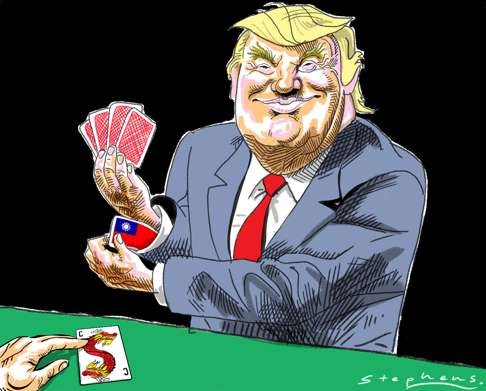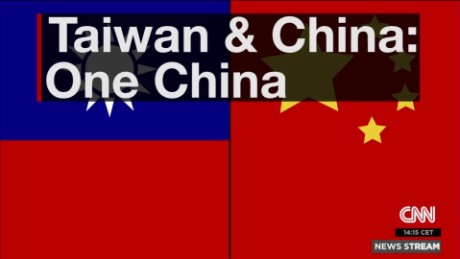 
 字體:小 中 大
字體:小 中 大 |
|
|
|
| 2016/12/19 13:10:50瀏覽628|回應2|推薦6 | |
|
美國總統當選人川普有關「一中政策」言論及與蔡XX通電話,「紐約時報」報導,台灣內部出現不同聲音與現象,不少人欣喜若狂、感到希望,但也有人感到不安。台灣人真是兩難進退不得? 前途未卜? 川普玩弄一個中國政策會令他身敗名裂? 中國與美國將進行另一波競爭世界的領導權. 「川普對中國的言論,台灣興奮與不安並存」(Taiwan Is Both Exhilarated and Unnerved by Trump's China Remarks)的報導,川普有關一中的談話讓台灣人既興奮又不安。台灣人渴望更多國際認同,但長期以來也擔心會被作為地緣政治棋局中的卒子,遭到捨棄。
台灣是美國第9大貿易夥伴,自1990年以來已向美軍購逾460億美元。川普執政後可能修改”台灣關係法”,? 協助台灣走向獨立之路? 這樣一來觸犯中國與美國長久以來的”一中政策”,中國勢在必行加速對於台灣的壓縮與排擠,從國際貿易,財政,經濟,外交,國防軍事,等角度同時下手,最終仍然會是以武力攻擊台灣,收復台灣省,完成統一大業,而美國在川普2017-2020 這4年執政期間,會加速軍售台灣淘汰型軍事武器與裝備,但是西方觀察家則認為,美國有可能出售極少數的現役武器,給予台灣,那就是2012-2016年美國與日本,南韓等國家,軍事演習時剩下來的庫存品類,根據情資顯示出,這些現役美軍武器小自兩棲突擊步槍,大到兩棲登陸艦以及淘汰型鷂氏垂直起降戰鬥機,淘汰型F18/A戰鬥機,M1A1坦克車,等相關狼犬武器裝備都出售給予台灣,讓台灣的阿兵哥忙得不可開交,學習使用這些對他們而言”先進武器”?
川普玩弄台灣亦會付出代價 至於台灣最需要的反而飛彈系統則否,現在台灣人才知道川普這隻披者羊皮的狼,為時已晚,這是你們台灣人小英,窮極無聊,隨便打電給話給川普得到的回報與代價,台灣納稅人辛苦的血汗錢,預計至少1000億美元左右,孝敬川普.你們台灣人應該舉辦公投廢除”台灣關係法”,自謀生路否則20170120川普執政3個月內勢在必行的修改台灣關係法對於台灣看似有利實則是出賣台灣的另一章.你們台灣人何去何從何必如此的任由美國人擺佈? 難道排台灣真的是美國的自動提窾機? 美國人又不是台灣人的祖宗為何對他把百依百順?
台灣關係法沒有台灣人的簽署為什麼你們台灣人要遵守? 你們台灣人永遠不敢反對美國,就永遠被美國踩在腳下,賤蹋,直到壓乾外匯存底及黃金儲備為止,至於中國將在2020年左右時期攻打台灣,雖然是網路傳言,但也是參考,你們台灣人要提前準備,接受戰爭的洗禮,因為台灣人的好日子過到盡頭喇.
Taiwan Is Both Exhilarated and Unnerved by Trump’s China Remarks. Lin Fei-fan led the charge nearly three years ago when hundreds of students occupied Taiwan’s legislature to protest a trade deal with China. With the island’s economy increasingly tied to the mainland’s, and Beijing’s global influence on the rise, he worried that Taiwan’s independence was at stake — and might be a lost cause. Now, thanks to a couple of sentences uttered by Donald J. Trump on a talk show, Mr. Lin has new hope. The president-elect stunned the world on Sunday by suggesting he might abandon the One China principle, the bedrock understanding under which the United States established relations with Beijing and cut official ties with Taiwan nearly four decades ago. His apparent willingness to rethink longstanding American policy that prioritizes China over Taiwan has energized Mr. Lin, 28, and many like him. But it has also left them anxious, and asking: What does it mean for one’s homeland to be put on the table by Mr. Trump, an inveterate deal maker, in negotiations with China’s Communist leaders, who are not known for making concessions easily? Even as he has elevated Taiwan’s status by speaking on the phone with its president, Mr. Trump has left the impression that he sees the island primarily as leverage to extract compromises from China on other issues. “I don’t know why we have to be bound by a One China policy unless we make a deal with China having to do with other things, including trade,” he said, before also citing Beijing’s military buildup in the disputed South China Sea and its support for North Korea. Not since Richard M. Nixon traveled to Beijing in 1972 to dangle the prospect of abandoning Taiwan has an American leader so explicitly attempted to use it as a bargaining chip with China, which considers the self-governing island of 23 million to be part of Chinese territory. The gambit has both exhilarated and unnerved the people of Taiwan, who yearn for greater international recognition but have long been worried about being sacrificed as a pawn in a geopolitical chess game. Cutouts of Hillary Clinton and Donald J. Trump at a hotel in Taipei in November. Mr. Trump has left the impression that he sees Taiwan primarily as leverage to extract compromises from China on other issues. Credit Billy H.C. Kwok/Getty Images any have applauded Mr. Trump’s stand, describing his decision to break protocol and speak by phone with Tsai Ing-wen, Taiwan’s leader, as an overdue gesture toward one of Washington’s most reliable friends in Asia and a young democracy. Taiwan is the United States’ ninth-largest trading partner and has purchased more than $46 billion in American weapons since 1990. “He’s an uncontrollable force,” said Hsu Tse-mei, 57, a retired bank manager in Taipei. “We’re caught between two powerful countries, China and the United States, and we’re at the mercy of Trump.” The stakes are high and help explain why Mr. Trump’s predecessors have generally left the One China policy untouched.Since the Nationalist government under Chiang Kai-shek fled to Taiwan in 1949 after the Communist Revolution, generations of Chinese leaders have vowed to reunify the island with the mainland and threatened war to prevent it from formally declaring independence. In the mid-1990s, China fired missiles into waters off Taiwan in an attempt to intimidate supporters of a formal separation. When the United States established relations with China in 1979, dropping its official recognition of the Nationalist, or Kuomintang, government in Taiwan, it secured a pledge from Beijing that its “fundamental policy” was to pursue reunification by peaceful means. Many in Taiwan are now afraid that China could reconsider that commitment if Mr. Trump scraps the One China policy.
“I’m worried that China may take military action against Taiwan,” said Li Meng-chieh, 33, a graphic designer in Taipei. “If that happens, it will derail our current way of life.” Such worries extend even to supporters of President Tsai, whose Democratic Progressive Party has long favored greater independence from the mainland and has traditionally been willing to accept greater risks to pursue it.
台灣被解放的日子愈來愈近喇
|
|
| ( 時事評論|政治 ) |






















